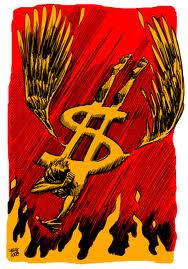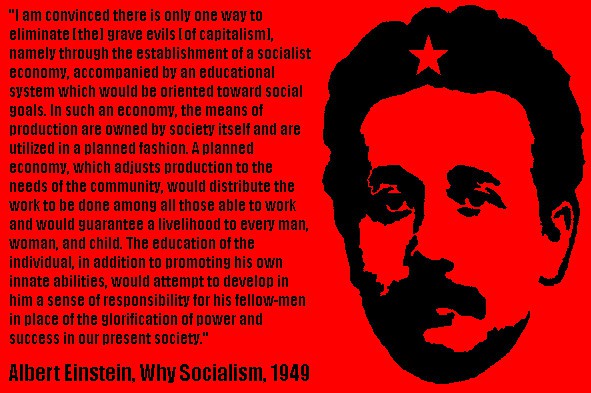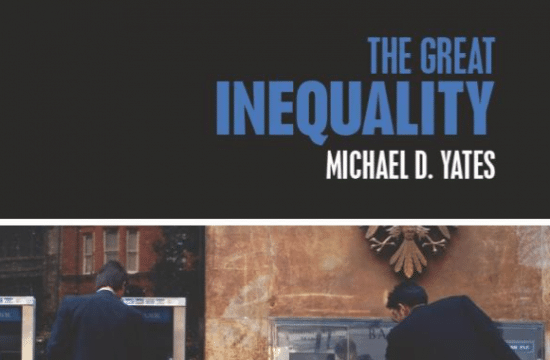 A left-wing economist with whom I have a marginal acquaintance sent me an email a few days ago. He was angry that I had accused him of being a “true believer.” This was in reference to what Karl Marx termed the “tendency of the rate of profit to fall.” Put simply, my accuser is certain Marx demonstrated that as capitalism develops and businesses succeed in expanding their production, they discover, against their will, a falling rate of profit on their invested capital. The resulting decline in profitability is the cause of economic crises, as businesses refuse to make investments at the lower rate, resulting in a reduction in their workforces, reduced consumer spending, and so forth. The “tendency of the rate of profit to fall,” is, according to its adherents, the fundamental “law” of capitalism, the central star around which everything else revolves. I suggested otherwise, and, as many radicals can attest, this always raises the ire of those who are convinced the “law” is true.
A left-wing economist with whom I have a marginal acquaintance sent me an email a few days ago. He was angry that I had accused him of being a “true believer.” This was in reference to what Karl Marx termed the “tendency of the rate of profit to fall.” Put simply, my accuser is certain Marx demonstrated that as capitalism develops and businesses succeed in expanding their production, they discover, against their will, a falling rate of profit on their invested capital. The resulting decline in profitability is the cause of economic crises, as businesses refuse to make investments at the lower rate, resulting in a reduction in their workforces, reduced consumer spending, and so forth. The “tendency of the rate of profit to fall,” is, according to its adherents, the fundamental “law” of capitalism, the central star around which everything else revolves. I suggested otherwise, and, as many radicals can attest, this always raises the ire of those who are convinced the “law” is true.
There are good reasons to believe that there is no such “law,” that Marx’s logic in discovering it is flawed. It has even been plausibly argued that Marx, himself, realized the fault in his reasoning and abandoned the “law.” But let us suppose that it is true. What then? Will the inevitable economic crises bring forth rebellion and revolution? History doesn’t give us much reason to be optimistic. Will the crises deepen, each one worse than its predecessor, ultimately making life so unbearable that the exploited masses rise up in fury, destroy capitalism, and set about building a socialist world? Again, reality provides little comfort to those who think that this has been the case or will be someday. Today, it seems more sensible to think that the expansion of capitalism into every part of the globe and every aspect of our lives will sooner rather than later generate a catastrophic environmental meltdown. This is the crisis that is most likely to happen, profit rates notwithstanding. Whether it will be the catalyst for revolution is anyone’s guess.
Those who champion the “law” take it as an empirically testable proposition and have devoted extensive efforts to demonstrating that profit rates have actually fallen. Against investigators who have not uncovered diminishing profit rates, the “law’s” devotees trot out two arguments. First, they point to certain countervailing tendencies that can delay the decline in profit rates, such as foreign investment. Or, second, they say that their opponents have used incorrect definitions of the relevant variables. If these defenses of the law read like those made by some neoclassical economists to show that the economy would have prospered but for some sort of government-induced distortion of the marketplace, this is because they have a striking similarity. If I say that the government has been doing all it can to make the market king and still we have problems, the economist says that the state has not done enough. If I say that the evidence suggests that raising the minimum wage does not appear to cause a loss of employment, the economist says that I haven’t defined my terms correctly or specified my model properly, haven’t perhaps made certain that the right “other things” have been held “equal.”
The person who sent me the email had written a critique of a Marx scholar and economist who attempted to show that, from a theoretical standpoint, there is no tendency of the rate of profit to fall. The scholar then responded to his critique, and that of several others. Then those who had offered criticisms replied to this response. If the scholar were to respond again, there would surely be another round of “debate.” In fact, there would be as many rounds as the original writer had the stomach to endure. I don’t think he will embark upon a second set of skirmishes. He knows wasted time when he confronts it. He understands that he is dealing with “true believers” and that no amount of logic, no piling up of evidence, will ever convince his adversaries. I once said about neoclassical economics: “The main trick used by professors of economics is to draw their pupils into a make-believe world and then convince them that [this] is a good approximation to the real world, enough so that the [reality] in which we live can be studied effectively by analyzing the fantasy world.” Marx analyzed capitalism in its “ideal average,” at a high level of abstraction. This “ideal average” can serve as a guide to examining the societies in which we live—the ones in which, as a friend of mine said, historical contingencies and political factors operate— but the two are not the same, something the disciples of the “tendency of the rate of profit to fall” school do not seem to grasp.
I therefore do not retract my “true believer” comment. However, my correspondent went on to say that I had impugned his “many years of serious Marxian scholarship.” Whether devoting “many years” to proving that there is a tendency of the rate of profit to fall represents serious scholarship, Marxian or otherwise, is an open question. Thomas Aquinas and many other Church fathers spent a good deal of time and effort proving that there is a god. They were serious, and they were scholars, adepts in Greek and Latin no less. Yet might not a rational person say that their efforts were a monumental waste of time, because they were trying to prove something that in the nature of things cannot be proved? Perhaps God has to be accepted on faith, just like the theory of the tendency of the rate of profit to fall.
What exasperates me more and more is the certainty with which so many people pontificate. As I get older, I think every day that, relatively speaking, we know less and less. We don’t know, for example, what existed before the “Big Bang.” We don’t know why we have gotten so much fatter as a species. We don’t know what causes many diseases. We can’t cure the common cold. We don’t know why some people get cancer and others do not. We don’t know why the native people of the southwest disappeared during the fourteenth century. We don’t even know why we think the thoughts we do. So, how is it that some are sure they know the root cause of economic crises, that we cannot grasp a social system as complex as capitalism unless we understand that there is a tendency of the rate of profit to fall?
Millions of words have been written in defense of Marx’s “law.” Given its alleged importance, you would think that all of this effort, this “serious Marxian scholarship,” would have borne fruit, hastening the demise of capitalism or at least alleviating its worst consequences: poverty, unemployment, demeaning and alienating jobs, poor health, environmental depredations, and the like. Unfortunately, there is no such fruit. The almost certain truth is that all of the words written, all of the conference presentations made, all of the verbal sparring, have yielded nothing. Capitalism shrugs off such stupidity. This awful system may end someday, but “serious Marxian scholarship” will have nothing to do with it.
This essay first appeared in CounterPunch, December 31, 2013: http://www.counterpunch.org/2013/12/31/profits-may-rise-profits-may-fall-the-capitalist-system-doesnt-care-at-all/








I therefore do not retract my “true believer” comment. However, my correspondent went on to say that I had impugned his “many years of serious Marxian scholarship.”
Andrew Klinman?
Dear Sheldon,
I find it a good thing that I don’t have even a marginal acquaintance with Kliman.
Thanks for the comment,
Michael Yates
Both neoclassical economists and more than a few Marxists are in the habit of formulating their theories so that they are not empirically falsifiable. In the case of the law of falling rates of profit this becomes evident when as Michael points out:
“First, they point to certain countervailing tendencies that can delay the decline in profit rates, such as foreign investment. Or, second, they say that their opponents have used incorrect definitions of the relevant variables.”
Once those two ad hoc hypotheses are embraced then it becomes clear that the law of falling rates of profit can never be refuted empirically. It’s enough to make one think well of Karl Popper.
Jim, thanks for the comment. To make matters worse, even on its own terms, it is impossible to show that profit rates tend to fall. This is what Heinrich has shown and what he argues Marx, himself, came to see and accept.
I can’t claim to be a “serious Marxist scholar,” but from the little I’ve read in Marx’s 3rd volume of Capital, I get the impression that Marx qualified his conclusions about falling profit rates more than either the “true believers” or you seem to be acknowledging. For one thing, I believe it was John Stuart Mill, Jr. who had earlier written about the “law” of falling profit rates, and Marx qualified this by writing about the “tendency” for the rate of profit to fall. This “tendency” could be counteracted, he noted, by several different contingencies in capitalism.
For example, Marx noted that as capitalist industries become more productive in their use of labor and more efficient at producing commodities per unit of investment, their proportional use of raw materials generally increases. The cost of raw materials therefore comes to be an important factor in determining profit rates.
Accordingly, if a capitalist industry can reduce its raw materials costs — say, by substituting a cheap and plentiful resource for an expensive and scarce one — the falling raw material costs may cancel out the effect of the [otherwise] falling profit rate. Or again, if a resource intensive industry like the Victorian chemical industry can find new and profitable uses for waste materials — if the industrial chemists can find ways to transform what was once harmful chemical waste into a recycled material that can be used to produce more chemicals — this increased efficiency in materials processing may counteract a falling profit rate. (As environmental historians note, the European & British chemical industries did, in fact, transform previously harmful wastes — like chlorine-based pollutants from alkali plants — into new raw materials in the late 1800s, which was probably part of what Marx was referring to in Vol. 3 of Capital. And chemical profits in the most innovative companies did in fact improve.)
There are several other ways that Marx mentions in which the “tendency” of the rate of profit to fall can be counteracted, if I remember rightly. But I can’t recall just where they’re mentioned in Capital, Vol. 3. Those who are interested should be able to look them up without much trouble, though.
I’m not writing this to support the “true believer” idea that Marx was always right about everything. I don’t think that a “materialistic” and “dialectical” understanding of capitalism or human history supports the notion that he could possibly have known enough in the late 1800s to predict exactly what capitalism would do in succeeding centuries. As Engels comments somewhere — I think in”Socialism: Utopian or Scientific,” or perhaps it’s in the “Anti-Duhring,” the idea of ANY system of thinking being perfect, complete and valid for all time is “a fundamental contradiction to the first law of dialectical reasoning.” I think Engels also had a point when he wrote that modern science, by the late 1800s, was only beginning to discover the laws governing many natural phenomena, and that Victorian technology and Victorian thought necessarily reflected this limitation. It stood to reason, Engels wrote, that many natural phenomena would have to await investigation and explanation by future generations. Obviously there’s no a priori reason why even extremely brilliant Victorians, like Marx, would necessarily have been able to predict all future economic developments, either.
For these reasons, I more or less agree with your critique of the “true believers.” But on the matter of falling profit rates, I think Marx was more nuanced in his approach to countervailing tendencies that your piece suggests.
Dear Andy Feeney,
Thank you for a thoughtful reply. I agree that Marx himself was far less dogmatic than our true believers. However, look at the Michael Heinrich essay referenced in my essay (it is linked). Heinrich’s short book, An Introduction to the Three Volumes of Karl Marx’s Capital, is an exceptional book, which, read along with the Monthly Review essay I referenced, will give you my view of Marx’s economics and the tendency of the rate of profit to fall.
Michael Yates
Andy, thanks for your thoughtful reply. I don’t think, though that show that profit rates can rise or fall says anything about the main point Michael Heinrich makes. Abstracting from any countervailing developments, it cannot be shown in the first place that there is an inevitable tendency of the rate of profit to fall. The Heinrich essay in Monthly Review gives chapter and verse on this.
Hi Mike. Thanks for uploading this post. The debate over the ‘law of the tendency for the rate of profit to fall’ is indeed incredibly complex, and highly charged politically within debates in radical political economy. Without raising the ‘bar’ or stakes in this issue, I am wondering if it is possible to hold an ‘agnostic’ position on these debates. On the one hand, there does seem to be a level of credible evidence that falling profits (or a failure in the production of surplus value) has played a role in the major crises in the history of advanced capitalism since the late 19th century. The 1970s crisis is, of course, the one most hotly debated even today, giving rise famously to several interpretations of the causes of that crisis that include the popular ‘profit-squeeze’ theory. What an agnostic position in its barest outlines might be as follows. Capitalism does depend on profits for its continued reproduction. When a major crisis does occur, one must do research into the historical specificities of what circumstances — political, economic, and social — were likely responsible to creating those conditions that set-up the unintended consequences economically. One cannot then assume or depend upon the action of this ‘law’ for every crisis. As far as the current crisis, there is, as you say, intense debate over what are the causes. What is unique is that unlike the debates around the interpretation of the crises of the 1870s, 1930s, and the 1970s, there is a lack of consensus about whether or not profitability, as a sort of independent variable, played an essential role. But let’s say that the current crisis was triggered by a financial crisis, but long lasting and deep due to the weakness in profits by 2007/8. In the situation that we are in now, there does seem to be a ‘disconnect’ between profits and investment because profitability has, in this view, recovered to pre-crisis levels. I am open to suggestions as to why this is the case. Some perspectives center on how the financialization and the political power it enables for finance capital shapes the distribution of income in this phase of neoliberalism so that the surplus flows away from investment, and to shareholders. There are likely to be other examples of this kind of explanation. These institutional factors are unique, and as a result make the current crisis unique. Profits still matter, but are overlaid by these specificities. I’d like to end these comments by declaring that in saying all this, I would like to see this debated opened up more, rather than reinforce the differences between the existing positions. And, I’d like to think that I am open minded about the promise of a kind of interpretation of Marxist political economy, but at the same time appreciating that the idea of historical materialism is to always be historical, and not depend on automatic tendencies. I believe that any radical transformation of society requires a conscious effort. This latter problem has been, I think, shown to be frustrating for a lot of the Left because whatever the causes of the current crisis, there is not the kind of radicalization or turning to the ‘left’ broadly in social movements, and obviously not amongst ‘professional’ economists. Best wishes, Robin
Robin, you make the excellent point that if say we are historical materialists, we must be historical in analyzing crises. There can be many factors involved and these may differ markedly from crisis to crisis. The closer we get to the actual material world, the more complex things get, the more chance events might come into play, political factors may rise to the fore, etc. And no doubt falling profit margins can obviously trigger downturns. But what causes the filling profits? To say it a rising organic composition of capital seems a ridiculously mechanistic approach. And those who hold to this view have gone through all sorts of mental contortions to deny the obvious points Michael Heinrich makes. Your final two sentences probably sum up the problem. If nothing is done by the working class, How is it that there is a crisis at all, except for the working class!
Great blast of welcome nihilism, from my point of view – sad to see all the dumb hubris of the peacock male flourishing on the micro-left.
Why does it matter so much if the rate of profit might fall, while profit is still accruing to the already super-rich, and fees and costs and financial obligations increase for the stagnated worker, as well as for the long-term unemployed? Who gives a damn how much the rate of “profit” fluctuates for the corporate elite? Kliman et al should read Gabriel Thompson’s “A Year in the Shadows” – that should get their focus back on where it should be – the lives of the global working poor.
Good to hear from you, Martin. I agree wholeheartedly with what you say. Keep in touch.
As Costas Lapavitsas now admits in a newspaper rant, “Finance is not particular about how and where it makes its profits, and certainly does not limit itself to the sphere of production. It ranges far and wide, transforming every aspect of social life into a profit-making opportunity.”
http://www.theguardian.com/commentisfree/2014/jan/01/finance-hold-everyday-life-broken-capitalism
According to fundamentalist Marxists, all profits arise in production, but this contradicts facts and logic. As soon as you admit the reality, i.e. that there is also a profitable trade in already existing assets, and that new assets can be created without production through transactions, then profitability in the economy as a whole is not exclusively determined by what happens in production, but by the totality of capital assets which attract profit (both physical assets and financial assets). This is not just a “small nuancing” of the fundamentalist argument, since the value of physical means of production owned by the private sector ranges between only 1/4 and 1/8 of the total stock of capital assets, in advanced capitalist economies. So in reality, for decades Marxists have been taught, and have been teaching, a false model of the economy. They have tacitly assumed that the economy consists only of production and consumption (the real economy) and that all the rest is only “fictitious”, consisting only of pseudo-commodities and fictitious capital. This is a very bad mistake to make.
Maybe the best way to analyze the question is not whether Marx is correct, but rather, whether the question’s assumptions are correct regardless of any reference to any particular theorist, whinger, pundit, economist.
Done in terms of whether Marx is or was this or that, or whether Marx actually believed this or that, or later disowned that belief of this or that?
Well that’s just more discussion glorifying Marx, even when you might occasionally show Marx was “wrong.” Your discussion’s choice of focus says all we need to know.
Of course, this is the problem throughout economics. Everything is extrapolated and it always reduces to Theorist A vs Theorist B. For some reason, economists only know religious worship of their chosen economic theorist.
It always looks like Judeo-Christian vs Muslim to me.